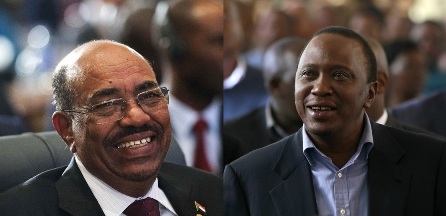Sudanese president receives phone call from Kenya’s president elect
April 8, 2013 (KHARTOUM) – The Sudanese president Omer Hassan al-Bashir today received a phone call from Kenyan president-elect Uhuru Kenyatta on the eve of his inauguration ceremony, state media reported.
According to Sudan official news agency (SUNA) Kenyatta thanked Bashir for his cable of congratulations he sent upon his victory in the presidential polls held last month.

The report said that Kenyatta expressed gratitude to Sudan’s supporting positions towards Kenya. The two men also discussed bilateral ties and ways to strengthen it.
Earlier in the day reports that the Sudanese president, wanted by the International Criminal Court (ICC), would be present at the inauguration ceremony had observers and diplomats buzzing and speculating about its implications.
In late 2011 a Kenyan judge ordered the government to arrest Bashir should he set foot in the country and issued a provisional arrest warrant in January 2012 for that purpose.
“Whereas the High Court of Kenya Hereby issues this provisional warrant of arrest against the said Omar al-Bashir and commands you, Professor George Saitoti, E.G.H., M.P., Minister of State for Provincial Administration and Internal Security and, failing you, the Minister for the time responsible for matters relating to national security, to apprehend the said Omar al-Bashir should he come to Kenya, and to surrender him to the International Criminal Court”, said the warrant signed by then judge Nicholas Ombija.
The ruling was in response to a filing made by the Kenyan chapter of the International Commission of Jurists (ICJ) that sought to compel Nairobi to detain the Sudanese leader if he visited again.
The government appealed the ruling which remains pending and its officials stressed that Bashir enjoys full immunity as a sitting head of state.
Kenya is a member of the ICC which in 2009 and 2010 issued two arrest warrants for Bashir on ten counts of war crimes, crimes against humanity and genocide he allegedly committed in Sudan’s western region of Darfur.
Despite the country’s legal obligation under the ICC’s statute, it chose to receive Bashir in August 2010 without arresting him, prompting the ICJ to move the issue to the High Court.
Kenyan officials today made conflicting statements on Bashir’s status and whether he was invited and expected to come or not.
The Kenyan government spokesman Muthui Kariuki told the BBC earlier today that Bashir had been invited and would not be arrested if he accepted the invitation despite the local court order and the ICC arrest warrant.
But the Kenyan Ministry of Foreign Affairs’ permanent secretary Thuita Mwangi told the Associated Press (AP) later that the Sudanese president will not be coming for the swearing-in of Kenyatta. He also disclosed that Sudan’s government was invited but not Bashir.
Mwangi declined to say whether Bashir was not coming because of the Kenyan court ruling or out of fears of angering either the prosecutor or judges at the ICC.
Today the ICJ sent a letter to the Attorney General Githu Muigai urging him to execute the arrest warrant.
“President al Bashir’s invitation and subsequent presence on the territory of Kenya amounts to a breach of the Constitution, the International Crimes Act, and the Rome Statute of the International Criminal Court”.
“In addition, we request you to enforce the provisional warrant in keeping with the decision of the High Court to the effect that any legal person may enforce the provisional warrant”.
On Sunday, the pro-government Akbar al-Youm newspaper said that Bashir will fly to Nairobi today for the ceremony which starts on Tuesday and from there will head to Chad which also an ICC state party.
There was no official confirmation from the Sudanese presidency even though another pro-government newspaper corroborated the story on Monday.
Adding to the confusion were statements made to Sudan Tribune yesterday by South Sudan minister of information Barnaba Marial in which he said that president Salva Kiir may meet Bashir on the sidelines of the inauguration of newly elected Kenyan leader.
E.J. Hogendoorn, an Africa analyst with the International Crisis Group, wondered what Kenyatta would gain from inviting al-Bashir.
“It would certainly antagonize Western governments. Despite all of Jubilee’s anti-western rhetoric, Kenya still needs their assistance and investments,” he told AP, referring to Kenyatta’s political party.
A visit by Bashir to Kenya without being arrested would have almost certainly triggered a clash between the reformed Kenyan judiciary and the executive branch over adherence to the widely applauded constitution of 2010.
Following the issuance of an arrest warrant for Bashir by the Kenyan judge, the country’s chief justice Willy Mutunga warned the government that it must respect the law in light of statements made by officials in Nairobi suggesting that they will not abide by the ruling.
“To choose not to obey court orders is to overthrow our Constitution. Court orders apply universally to ordinary citizens, corporations, members of the Judiciary, Executive and Legislature. If a country chooses to live by anarchy, it must be ready to face the consequences of disregarding the law,” Mutunga said at the time.
“It is worrying that senior Government officials can make disparaging public pronouncements that seek to undermine the independence of our judicial officers and ultimately the judicial system,” he said.
An African lawyer speaking to Sudan Tribune said that in a perfect world officials including the Kenyan foreign minister and police chief could be ordered detained by the court if they do not enforce the warrant.
The incoming Kenyan president himself will go to trial in July of this year at the ICC on charges that he orchestrated post-elections violence of 2007. Kenyatta’s deputy president, William Ruto, faces similar charges. His trial is set for late May.
However both men have signaled they will cooperate with the court despite being elected.
(ST)
